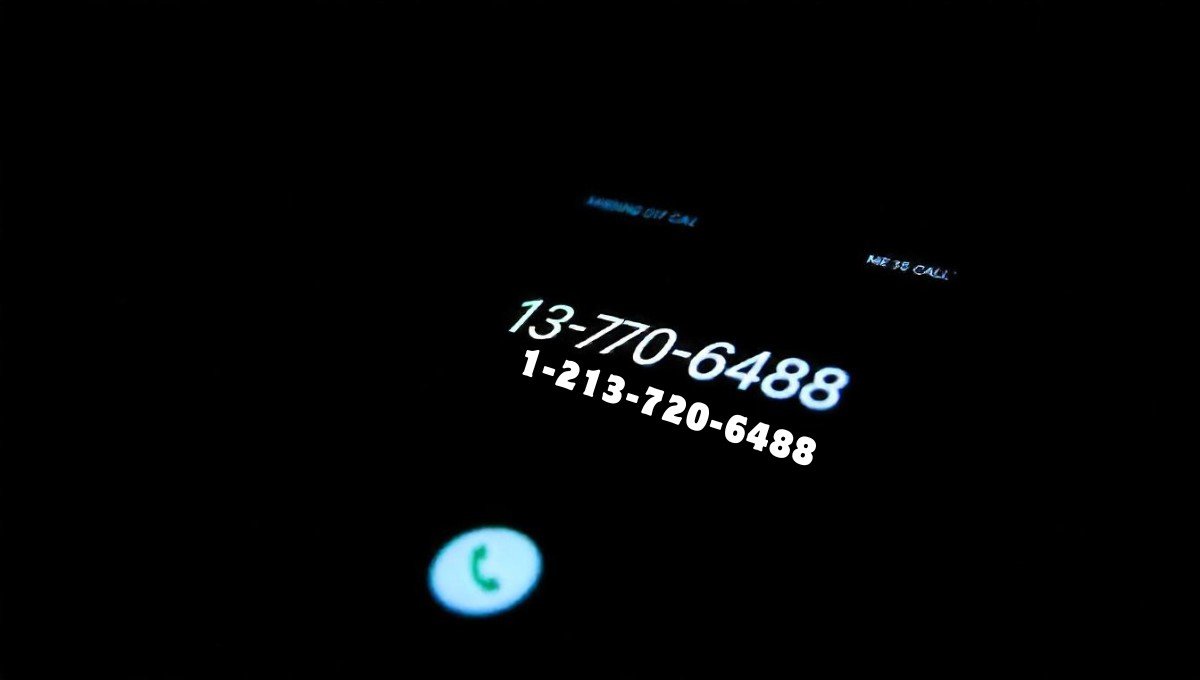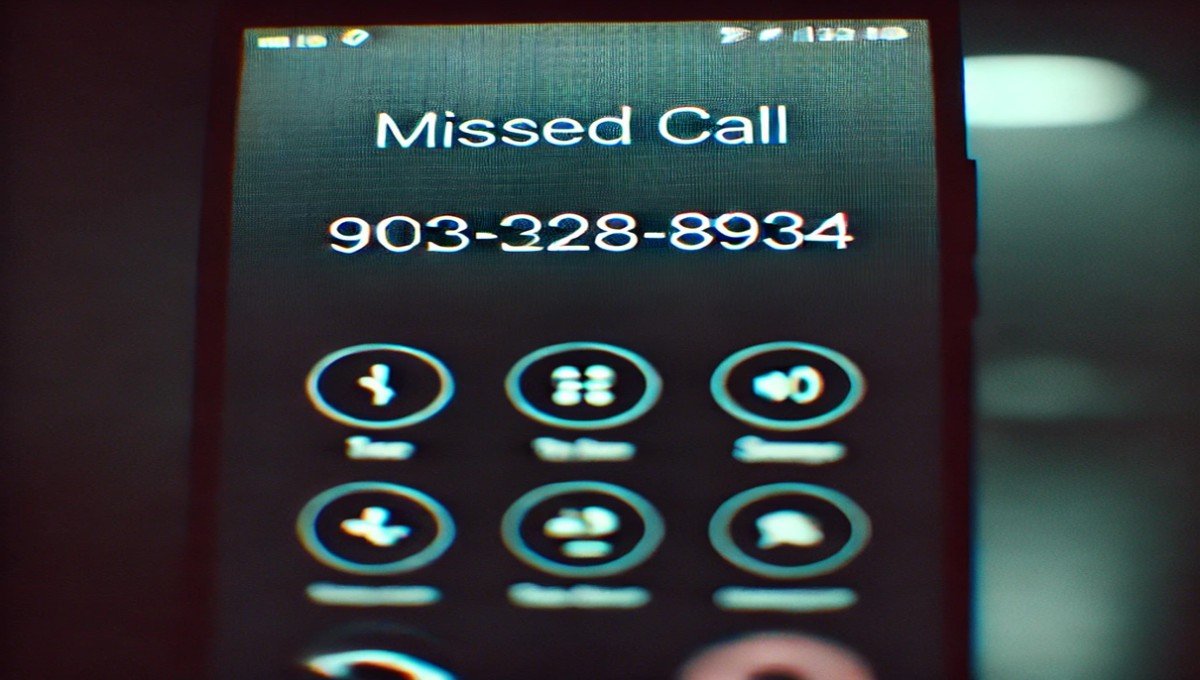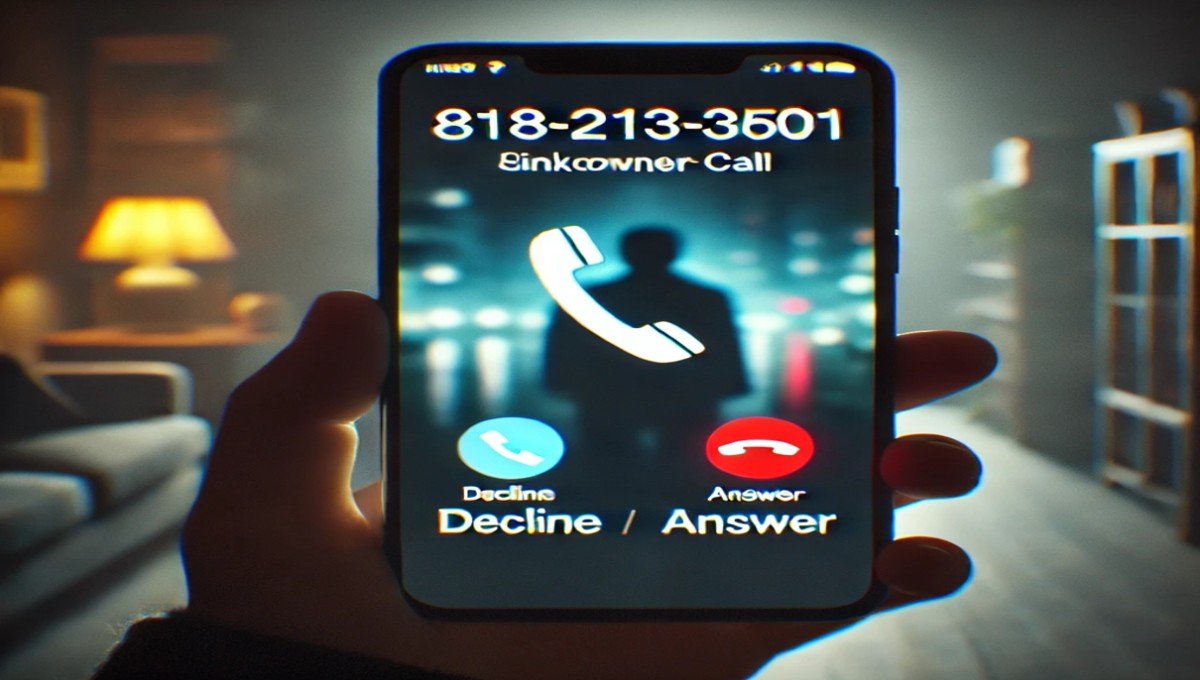Blog
1-213-720-6488: Why You Should Never Ignore This Call

Today in the world of communication, it is quite common to have people who forget to pick up on the calls they don’t know about with unfamiliar numbers. But what if one of those numbers is bigger than you think? One such number that has caught the attention of many is 1-213-720-6488. However, when you can ignore a call and it’s not going to the voicemail, this blog will show you why you really should not ignore this call and could end up missing opportunities or even putting your organization at risk.
Table of Contents
Understanding the Number
The number 1-213-720-6488 originates from the 213 area code, which is assigned to Los Angeles, California. It is a busy area of businesses, government agencies and service providers. As you could be reaching out to a highly populated and active region, this number can also be a legitimate one. But it’s worth remembering that there are both the pluses and the minuses of answering or ignoring such a call.
You Shouldn’t Ignore the Call
1-213-720-6488 could be tied to important matters that affect your personal or professional life. Here are a few reasons why it might be worth your time:
1. Lost Business Opportunities
The 213 area code includes many businesses and corporations in Los Angeles. If you’re someone who works in a tie that has a relationship with companies based in California, ignoring this call would mean losing out on business deals and jobs. This area is run by many recruiters and business clients, so it is important to pick up or return calls from numbers beginning with 213 that aren’t familiar.
2. Service Providers
But ignoring this call may stem from another reason, it could be due to service providers trying to call you. Whether it’s your internet provider, phone company, or even your bank, calls from numbers like 1-213-720-6488 might be important. They could be notifying you about an issue with your account, service disruptions, or an opportunity you have to upgrade something ASAP.
3. Emergency or Legal:
Marine Lawyers
In some ways the 213 area code is also linked with government offices or law enforcement. Receiving a call from 1-213-720-6488 could potentially involve matters like court notices, jury duty summons, or even emergency situations that need your attention. If you ignore this call, you could face unintended legal complications or delays in getting fundamental information to you.
When Answering May Be Dangerous
Sure, there are good reasons to pick up a call but it’s equally important to look at the risks of picking up a call from an unknown number.
1. Scams and Robocalls
Some scams and robocalls are notorious for unsolicited calls. Fraudsters may use numbers like 1-213-720-6488 to deceive individuals by pretending to be from government agencies, financial institutions, or tech support. Never answer questions on the phone, save for when you know the caller is who they are, in which case you should never give out your personal or financial information.
2. Spoofing
In some cases, scammers use spoofing technology to make their number appear as though it originates from a legitimate source, such as 1-213-720-6488. So, even if the number looks like it should be right, the call may be fraudulent. A verified number or a call on the official contact details of the organization is always recommended because you need to verify the caller’s identity.
Conclusion
While receiving a call from 1-213-720-6488 can feel uncertain, it’s essential to weigh both the benefits and risks. It may be to do with critical stuff like business opportunities, service providers, or perhaps even legal stuff. But there’s also a chance of scams so don’t go in blindly. Answer or ignore, balance your approach and your mind may wonder but you’ll be careful of fraud and not miss out on something critical because of it.
FAQs
1. What should I do if 1-213-720-6488 is a robocall?
If you determine that 1-213-720-6488 is a robocall, hang up immediately and consider blocking the number using your phone’s settings or a call-blocking app.
2. Can 1-213-720-6488 be a scam number?
Of course, while it could be legitimate, scammers sometimes use spoofing to make it seem that their calls are coming from trusted numbers. Before providing any personal information, make sure you can verify on your own the caller who is asking.
3. Am I supposed to check if the number is important ?
Or let the call go to voicemail and search the number online to see if other people have reported it as a scam or as a legitimate business.
Blog
Nematode Nemesis: How Paecilomyces lilacinus Fights Root-Knot Nematodes

Being soil borne, pest problems are always a constant menace to most farmers. Of these pests, root knot nematodes are one of the more devastating and affect the production of crops such as tomatoes, potatoes, carrots, and strawberries. These small worms penetrate the plant root and create galls out of which they feed, thereby depriving the plant of water and nutrients to produce stunted and poor yielding plants in the worst scenario, death.
Because of the high prices farmers pay for chemical treatments, the environmental impact of these products, and the need to find alternatives, the subject has never been timelier. Introducing Paecilomyces lilacinus, another biocontrol agent that is causing shifts in management of nematodes.
Table of Contents
The Problem: Root-Knot Nematodes
Emma Hernandez, an organic strawberry farmer, making her livelihood from a rural farming community in California, greatly experienced this problem. Her farm used to be able to produce fresh organic strawberries for years now her yields have started decreasing. Their strawberry plants started producing yellow leaves, wilting, and poor growth and they couldn’t fix it even with organic fertilizer and water. When examined more carefully she realised that most of the plants in the pots had roots that were gall and blistered due to root-knot nematode (RKN). These microscopic pests had invaded her soil, and here farm was at risk for an economic loss that forced her family farm business.
Root-knot nematodes are well-known for their capability to remain in soil for indefinite time, if there is no host plant around. It can lead to significant yield loss in all types of crops, and managing them organically without affecting the soil food web has been a challenge for most organic farmers such as Emma. Unfortunately, we can’t use pesticides because they harm useful microorganisms in the soil; crop rotation helps, up to a certain point, to mitigate the issue.
Enter Paecilomyces lilacinus: The Natural Solution
It was at that point where Emma found Nema Pro, for root knot nematode control, is a biocontrol product consisting of the active fungus, Purpureocillium lilacinum, also known as Paecilomyces lilacinus. It is strictly a naturally occurring fungus that proved capable of causing damage to the root-knot nematodes both in the soil and on the roots of plants.
P. lilacinum (formerly Paecilomyces lilacinus) is a nematophagous fungus that has potential properties as a biocontrol agent by developing within eggs and second-stage juveniles of root-knot nematodes. When the virus finds itself in the immediate vicinity of a nematode, the fungus releases enzymes that are in the nematode shell thus suffocating the nematode larvae. The fungus kills both the free living nematode larvae and those that are parasitic on plants when they come into contact with the fungus. The end effect is the effective control of nematodes, the death of which occurs without the negative impact on the beneficial bacteria in the surrounding territory.
How NemaPro Works
In an endeavour to offer farmers like Emma a green solution to controlling nematode pests, NemaPro has distilled the best from Purpureocillium lilacinum. The product, sold both as a soil drench and a root soak, is most effective if used before nematode numbers increase to a dangerous level, which is why it’s best used in early spring. Here’s how it works:
- Soil Application: NemaPro is applied directly to the soil in which it forms spores that then instinctively hunt for nematode eggs and larvae.
- Parasitism: The fungus presumably invades eggs of the nematodes and inhibits their further development, as well as killing the eggs prior to their transformation into the larvae phase.
- Larval Control: When nematode larvae touch or consume the smuts in the soil they die and thus are unable to perpetually damage the root systems.
The Results: A Sustainable Solution
That is why Emma used NemaPro at her farm while practicing her usual organic farming techniques. In a few weeks, she had perceived the enhanced health of the strawberry plants she had planted. In the control trees, the roots became healthy and contained less gall and deformation than the treated ones. The plants grew healthier, and higher yields were produced without use of poisonous chemicals on the crops. To this end, Emma was in a position to save her outing and increase her farm’s production.
She even got even better results when she repeated the treatment the following season. From the case, it was established that by applying nematodes appropriately by using NemaPro constantly, there is less chance of additional measures being taken and minimal risk of crop losses.
Why Paecilomyces lilacinus is Better Than Chemical Products?
The use of Paecilomyces lilacinus offers several advantages over traditional chemical nematicides:
- Eco-friendly: In this compared to chemical treatments, nemapro does not affect the earthworms or microorganisms which are very essential in the improvement of the soils.
- Reduced Resistance: Because root-knot nematodes can build up resistance to chemical control measures, their management may be a continuous task. Since NemaPro is a biological product, chances of this product being rendered ineffective due to emergence of nematode resistant to it in the flour, are low.
- Sustainability: NemaPro integrates well with the organic farming industries; the benefits it presents are consistent, and sustainable without affecting the quality of soil and water.
- Safety: NemaPro is safe for farmers, workers and consumers with no toxic residues left on the crops.
Conclusion
NemaPro as the future Nematode active control The above literature review shows that NemaPro has the potential of being the future nematode active control from others at University of Phoenix.
Enumerated below is the story of Emma and NemaPro and Purpureocillium lilacinum, thus illustrating how biocontrol agents are ousting Synthetic Chemicals in agriculture pest control. Since nematodes are one of the most chronic and devastating pests to crops for farmers globally there is a high demand for better, long-term non-chemical methods of controlling it. Due to NemaPro and similar products, farmers have a good tool for dealing with the nematode pest menace in a sustainable manner without harsh costs on crops, income, and the natural world.
With the growing population’s shift towards opting for organic foods and those grown through sustainable farming practices, biological control solutions such as Paecilomyces lilacinus will equally form the basis for providing farmers with enhanced tools with which to combat pests while at the same time reducing the impacts of such pests on productivity of their farms and the soil.
It is believed therefore that for farmers, who are grappling with root-knot nematodes, Nema Pro is what nematodes meant to be — natural, efficient, safe nematodes fighting one of Agribusiness’ most stubborn foes. To know more about biological control of nematode disease, visit Novobac.
Blog
903-228-8934: Intriguing Connections, Revealed Today

In the age of digital communications, we’re often bombarded with unknown numbers calling our phones. One number that has piqued significant interest recently is 903-228-8934. Reports, forums, and community discussions online have sparked curiosity, leading people to wonder about the identity and purpose behind this phone number. If you’ve received a call from 903-228-8934 or are simply interested in understanding more, read on for insights that could reveal its true nature.
Table of Contents
Why Is 903-228-8934 So Intriguing?
903-228-8934 is a phone number that originates from the 903 area code, which serves parts of East Texas. This area code is associated with a variety of Texas locations, including Tyler, Sherman, and Longview, extending to cover both urban and rural regions. While phone calls from unknown numbers aren’t rare, 903-2288934 has drawn attention due to certain unusual aspects.
Online, people report receiving calls from 903-228-8934 that often disconnect after a few seconds. Others mention that the caller doesn’t leave a voicemail, creating even more speculation. In today’s digital world, calls from unknown numbers can lead to suspicion of scam calls, robocalls, or even telemarketing schemes. But is that the case with this particular number?
Theories Behind 903-228-8934: Scam, Robocall, or Something Else?
With the number 903228-8934, users have reported a variety of scenarios. Below, we break down common theories:
- Robocalls or Automated Messages
Some people believe that 903-228-8934 is associated with automated or robocall systems. Robocalls are increasingly common, especially with the rise of marketing automation. These calls often target a wide audience, promoting products, services, or special offers. Robocalls, however, frequently hang up if they detect an automated voicemail system, which could explain why no voicemail is left. - Telemarketing Tactics
Another possible theory is that 903-2288934 belongs to a telemarketing agency. Telemarketers often use technology that calls multiple numbers simultaneously, connecting with the first respondent while ending other calls. If you don’t pick up immediately, you might experience a hang-up, leaving no way to identify the caller. - Potential Scam Calls
Unfortunately, scam calls are not uncommon. Some calls from numbers like 903-228-8934 may try to obtain personal information by pretending to be a trusted entity, such as a government organization or a bank. If you receive a call from this number and they request sensitive information, proceed with caution, as it may be a scam. - Spoofing Possibilities
Another possibility to consider is caller ID spoofing. Spoofing allows scammers to manipulate their caller ID to appear as a different number, often a local or familiar one, to gain the receiver’s trust. Although there’s no concrete evidence that 903-2288934 is a spoofed number, it remains a possibility.
How to Handle Calls from 903-2288934
If you’ve received a call from 903-228-8934, here are a few practical steps you can take to protect yourself:
- Let Unknown Numbers Go to Voicemail: If you don’t recognize a number, consider letting it go to voicemail. Legitimate callers will likely leave a message.
- Don’t Provide Personal Information: Avoid sharing sensitive information over the phone, especially if the caller is pressuring you or sounds suspicious.
- Use Call-Blocking Apps: Call-blocking apps can help you screen and block unwanted calls. Many apps allow users to report numbers, providing valuable feedback for others.
- Report Suspicious Activity: If you suspect 903-228-8934 is being used for scams, you can report the number to organizations like the Federal Trade Commission (FTC) or the Better Business Bureau (BBB).
Understanding the Caller Behind 903-228-8934
The truth behind 903-2288934 may never be fully clear without official information. While some callers from this number may be innocuous telemarketers, others may have less reputable motives. In either case, it’s always wise to exercise caution and remain vigilant, as unsolicited calls can often lead to phishing attempts or scams.
If you’re concerned about calls from 903-228-8934, remember to use technology and common sense to manage unknown contacts. Staying informed and alert is key to navigating today’s complex world of digital communications.
FAQs
Q1: Who is calling from 903-228-8934?
A: Calls from 903-2288934 may be linked to telemarketing, automated messages, or possibly scam attempts. No official identification has been confirmed.
Q2: Is 903-228-8934 a scam number?
A: While there are reports of suspicious behavior, including hang-ups and no voicemail, there is no definitive proof that 903-228-8934 is a scam. It’s best to be cautious.
Q3: What should I do if I get a call from 903-228-8934?
A: If you don’t recognize the number, let the call go to voicemail, avoid providing personal information, and consider using a call-blocking app to manage unknown contacts.
Blog
818-213-3501: Who’s Behind the Call? Find Out Now!

Receiving an unexpected call from a number you don’t recognize, such as 818-213-3501, can be unsettling. Many people wonder who is calling and what they want, especially when the number is unfamiliar. In today’s world of telemarketers, scammers, and anonymous calls, knowing the caller’s identity can help you decide whether to answer or ignore the call. Let’s break down what you need to know about 818-213-3501, who might be behind it, and how to protect yourself from potential scams or unwanted calls.
Table of Contents
Why Am I Getting Calls from 818-213-3501?
If you’ve received a call from 818-213-3501, you’re not alone. This area code (818) is primarily used in the San Fernando Valley region of Los Angeles, California. However, identifying the specific purpose of the call can be tricky without answering. Here are a few common reasons you may be getting these calls:
- Telemarketing and Sales: Many businesses use automated systems or third-party companies to reach out to potential customers. They may be promoting products, services, or conducting market research.
- Scams and Robocalls: Unfortunately, scammers frequently use phone numbers that appear legitimate to trick people. Calls from unknown numbers can sometimes be linked to fraudulent schemes, with scammers attempting to gain personal information or persuade you to transfer money.
- Important Updates: On a positive note, some legitimate calls from 818-213-3501 could be from companies or institutions you’ve previously interacted with. These could be follow-ups, customer support, or even reminders of appointments or due payments.
Ways to Identify the Caller Behind 818-213-3501
1. Use a Reverse Phone Lookup Service
A reverse phone lookup service can give you details about the caller. Websites such as Whitepages, TrueCaller, or Spokeo are designed to provide background information about a caller based on the number.
2. Search the Number Online
Type “818-213-3501” into a search engine to see if others have reported calls from this number. Often, online forums and community sites log users’ experiences with unsolicited calls. Reading these reviews can help you determine if the number is trustworthy or if others have reported it as a scam.
3. Check Caller ID and Block if Needed
Some phones provide a caller ID feature that can help you identify businesses or other callers. If you determine that the call is unwanted, many phones and services offer call-blocking options. Adding 818-213-3501 to your block list can help prevent future calls from this number.
How to Protect Yourself from Unwanted Calls
Identifying the caller behind 818-213-3501 is essential, but knowing how to handle the situation is equally important. Here are some useful tips:
- Do Not Answer Unknown Numbers: Unless you are expecting a call, it’s often safer to let unknown numbers go to voicemail. Many telemarketers and scammers do not leave messages, so you can ignore these calls without worry.
- Avoid Sharing Personal Information: Never share sensitive information, such as Social Security numbers or financial details, over the phone with unknown callers. Scammers often ask for this information under the guise of “verifying your identity.”
- Enable Call Screening Features: Some phone carriers and apps offer call-screening tools to filter out potential scam calls automatically. For instance, apps like Hiya, Nomorobo, and RoboKiller provide screening and blocking features to keep unwanted calls at bay.
What If 818-213-3501 Keeps Calling?
Repeated calls from 818-213-3501 may indicate a persistent telemarketer or scam attempt. In this case, you may want to report the number. Here’s how:
- Report to the FTC: In the United States, you can file a complaint with the Federal Trade Commission (FTC) through their official website. Reporting scam calls helps authorities track and prevent illegal activities.
- Add to National Do Not Call Registry: Registering your number with the National Do Not Call Registry can reduce the frequency of telemarketing calls. If you still receive unwanted calls after registering, these calls are likely scams, making it easier to decide to block the number.
Conclusion: Take Control Over Unknown Calls
Getting a call from an unknown number like 818-213-3501 doesn’t have to be stressful. By taking a few proactive steps—such as using a reverse phone lookup, blocking unwanted numbers, and reporting spam—you can manage these calls with confidence. While not all unknown calls are scams, being cautious is a smart approach in today’s digital age. Take control of your phone and protect your privacy by learning who’s behind the call.
FAQs
Q1: Is 818-213-3501 a scam number?
A1: It’s hard to determine without further details, but users have reported similar numbers as potential scams. Always verify before sharing personal information.
Q2: Can I block 818-213-3501?
A2: Yes, most phones allow you to block unwanted numbers. If you’re unsure, consult your phone’s settings or contact your carrier.
Q3: What should I do if I answered a suspicious call?
A3: If you accidentally shared information, monitor your accounts for unusual activity and consider reporting the incident to authorities.
-

 Games1 month ago
Games1 month agoMeerut City Satta King: Your Ultimate Guide to Winning!
-

 Business1 month ago
Business1 month agoDiscover Why debsllcs.org/ Is Leading in Sustainable Business Solutions
-

 Tech1 month ago
Tech1 month agoHow Do I Contact Hong Kong Reverse Technology for Solutions?
-

 Business3 weeks ago
Business3 weeks agoPedrovazpaulo Business Consultant to Unlock Growth: How They Can Help Your Business Thrive
-

 Tech1 month ago
Tech1 month agoHBM Packaging Technology Divergence Explained for Success
-

 Tech3 weeks ago
Tech3 weeks agoRajkot Updates News:When Will the Tesla Phone Be Released?
-

 Business1 month ago
Business1 month agoBreaking Down the Recruitment Process
-

 Health & Fitness4 weeks ago
Health & Fitness4 weeks agoDiscovering Wellhealthorganic Buffalo Milk Tag: A Healthier Choice for You and Your Family













